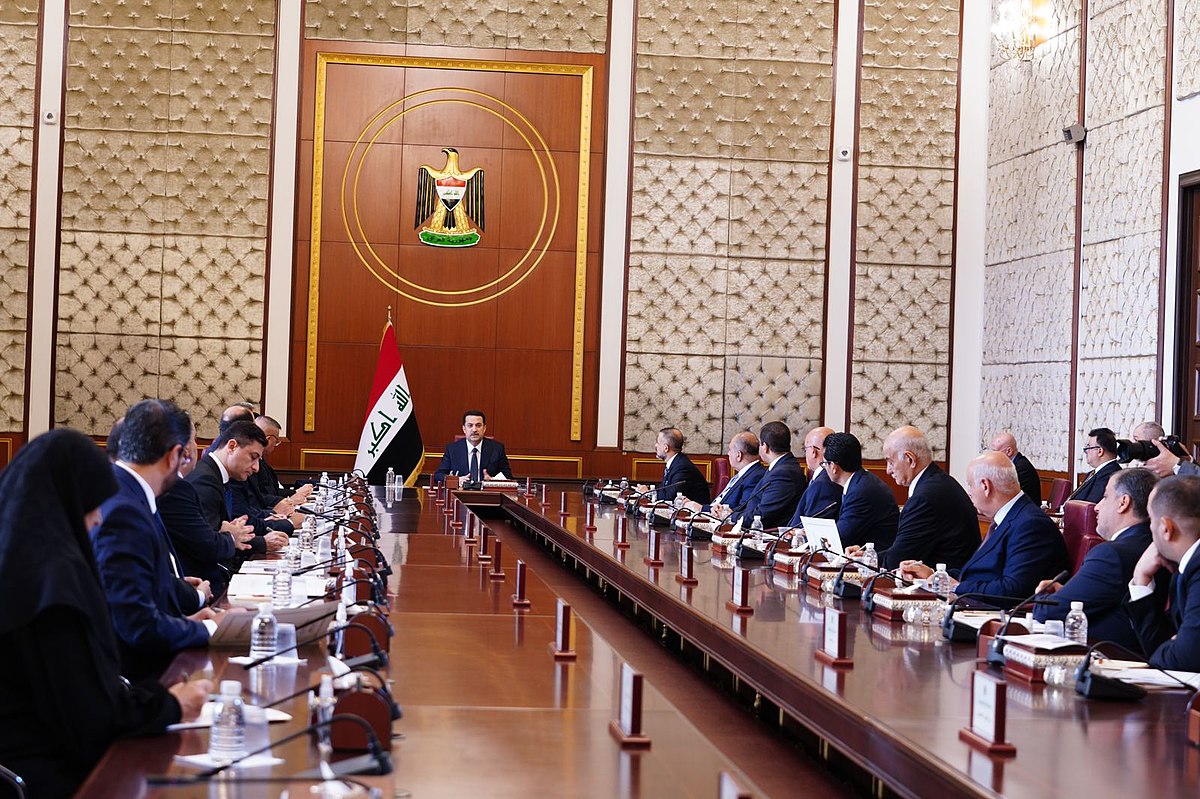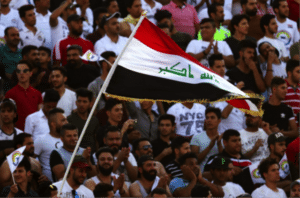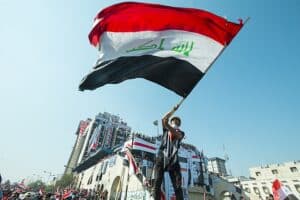The Council of Ministers headed by al-Sudani holds its first session on October 28, 2022 (source: Wikimedia Commons)
After more than a year of political deadlock, Iraq finally has a new government. The election of Kurdish politician Abdul Latif Rashid as Iraq’s new president and Shia politician Mohammed Shia al-Sudani as the country’s prime minister paved the way for the formation of the government. On October 27, Iraqi lawmakers approved the new cabinet, that will be headed by al-Sudani. The appointment of the cabinet follows a year of political unrest. Although the new cabinet is a significant breakthrough, expectations for real reforms are low.
Same figures and factions
According to critics, the new government perpetuates a political system in place since the US invasion, that has been associated with corruption and dysfunction. The political system is still dominated by the same figures and factions that appear to be mainly focused on preserving their position of power, rather than actual governance.
In Iraq’s political system of power-sharing, the presidency is reserved for a Kurdish candidate, the premiership is designated for Shia factions, and the speaker of parliament is traditionally Sunni. In this practice of ‘consensus governments’, that has dominated Iraqi politics since 2005, all political blocs are included in administration. The lengthy bargaining process and backroom politics that result from this practice are widely considered to be fostering political malfunctioning and clientelism. According to several watchdogs, Iraq has become one of the most corrupt and least transparent countries in the world. In a recent corruption scandal, 2.5 billion dollars disappeared from government funds.
Continuation corrupt system
The new government is certainly not a break with this practice of ‘consensus governments’. Rather, it perpetuates Iraq’s corrupt political system. Both Rashid and al-Sudani have been involved in Iraqi politics for a long time. Rashid served as minister of water resources and has been a presidential adviser since 2010. Al-Sudani rose to prominence under prime minister Nuri al-Maliki, while he was serving as minister of social affairs, human rights, and industry.
The Iraqi political system appears surprisingly resilient to outside challenges. It managed to close its ranks in the face of the large-scale protests of 2019. These protests were sparked by Iraq’s endemic corruption, high unemployment rates, and lack of basic public services.
Private session
The parties negotiated the division of key posts in the new government among themselves. Al-Sudani’s new cabinet was approved in a private session. Former prime minister Nuri al-Maliki – again – played a decisive role. Al-Maliki, who is supported by the Iran-backed Shia Coordination Framework, nominated al-Sudani for the position of prime minister.
The Coordination Framework has clashed with rival Shia faction of political leader Muqtada al-Sadr, the winner of the national elections in October 2021. Al-Sadr attempted to form a majority coalition ever since, but failed to do so, due to disagreements with the Coordination Framework. The political leader aimed to form a government with the Sunni Taqadoom party and the Kurdish KDP, which would side-line the powerful Coordination Framework. The disagreement between the two rivalling Shia blocs paralyzed Iraqi politics since October 2021 and erupted in violent clashes this summer.
Additional crises
In addition to the political instability of the past year, Iraq is confronted with several other crises. The country is plagued by high youth unemployment rates, power shortages, widespread distrust towards the political elites, a weak economy and crumbling public services. One-third of the Iraqi population is currently living in poverty. Moreover, the political paralysis of the past year has incapacitated the parliament’s ability to meet the Iraqi people’s needs, blocking important bills from passing. It is debatable whether the new government will prove to be a way out of the ongoing political stalemate, as it perpetuates a system associated with corruption and clientelism. Also, it may lead to further clashes between al-Sadr and rival Shia militias. The political future of Iraq remains highly unpredictable.
Sources: The Century Foundation, Al Jazeera, The New York Times, United States Institute of Peace
Photo: Wikimedia Commons



